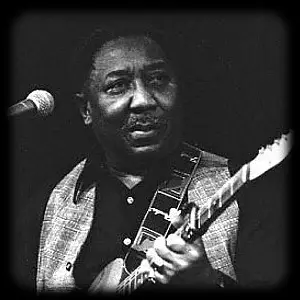Rollin’ and Tumblin’

Classic blues songs are often as well travelled as a sturdy set of luggage. They endure untold mileage and years in the hands of different bluesmen and rock stars. But few songs have experienced as tortured and improbable a journey as Rollin’ and Tumblin.’
The First Roll
On March 14th, 1929, A mysterious Tennessee bluesman known as Hambone Willie Newbern stepped into Okeh Records and recorded six tunes. The standout of the batch, Rollin’ and Tumblin’ would later become an oft-covered blues standard.
Although the single’s label credits the song to Newebern, its actual authorship is unclear. Borrowing elements from previous tunes was a common practice among early folk blues, and Rollin’ and Tumblin’ bears more than a little resemblence to Minglewood Blues recorded a year earlier by Gus Cannon’s Jug Stompers.
A solo piece that features Newbern’s aching vocal accompanying his slide guitar, the tune evokes the image of a bluesman travelling a dusty Mississippi road to find nothing but heartbreak. Thanks to dated recording technology, this tale of a doomed union sounds like a page from the history books. But its underlying message of despair and loss feels as vibrant and urgent as this morning’s news.
Hambone Willie Newbern was one of the first of many legendary artists to hail from the state of Tennessee.
Hambone’s Legacy
Recorded before the advent of ‘race record’ charts, the song has no chart history to speak of. Its legacy is in the multitude of covers it has inspired.
As for the song’s creator, Hambone Willie Newbern would never record again after that trip to the studios of Okeh Records. The details of his life’s final years are murky to even the most dedicated blues aficionado.
According to legend, Newbern died in a prison brawl in 1947, but blues historians have disputed this claim, insisting on the more mundane truth that he passed away in his Memphis, Tennessee home in 1965.
Rollin' and Tumblin' Lyrics
And I rolled and I tumbled and I cried the whole night long
And I rolled and I tumbled and I cried the whole night long
And I rolled this mornin', mama, and I didn't know right from wrongDid you ever wake up and find your dough-roller gone?
Did you ever wake up and find your dough-roller gone?
And you wring your hands and you cry the whole day longAnd I told my woman, Lord, 'fore I left the town
And I told my woman just before I left the town
Don't you let nobody tear the barrelhouse downAnd I fold my arms, Lord, and I walked away
And I fold my arms and I slowly walked away
Says, That's all right, sweet mama, your trouble gonna come some day
A True Blues Classic
Rollin’ and Tumblin’ was covered many times by many bluesmen, although the most famous is that by Muddy Waters, the most important may have been from Robert Johnson in 1936.
Changing the title to “If I had Possession over Judgment Day, Johnson shifted the song’s tone immensely, breathing new life into what might have otherwise been remembered only as a relic from the past.
If Newbern’s original take is a polite tap at your front door from a friend eager to regale you with a compelling tale of woe, Johnson’s rendition is an angry pound at your back door from a scorned lover demanding to know his woman’s whereabouts.
The urgency of his stabs at the slide guitar and his hair-raising howl went a long way to preserve this song’s standing as a blues classic. As the years went on, Rollin’ and Tumblin’s life was far from over.
Robert Johnson Changing the title to “If I had Possession over Judgment Day",
Dylan, Clapton and the Captain
The advent of the rock era did little to slow the song’s popularity. Rock artists such as Johnny Winter, Fleetwood Mac and Canned Heat all took a shot, often with memorable results. But a handful of renditions stand out from the crowd.
Bob Dylan’s 2006 version adds verses that intensify the sense of conflict, while Eric Clapton, in a version included on his landmark 1992 Unplugged album, adds an upbeat charm that nearly undermines the song’s darker elements.
Perhaps the oddest version belongs to Captain Beefheart, who mumbles, groans and grunts through nearly ten minutes of Rumblin’ and Tumblin.’ And yet for all the Captain’s eccentricity, he somehow captures the song’s anarchic spirit in a way that likely would have put a smile on Hambone Willie Newbern’s face.
